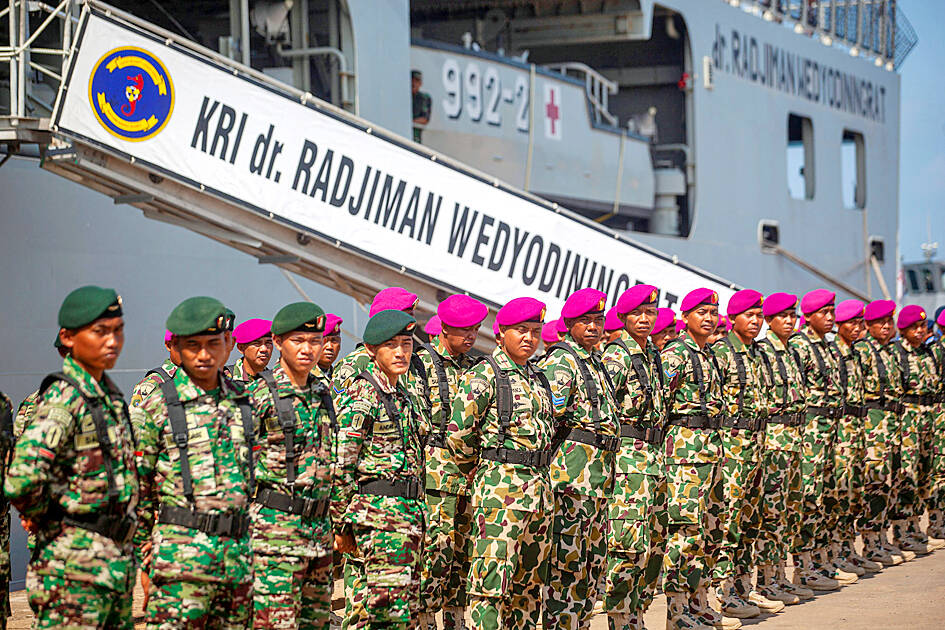ASEAN nations yesterday began their first joint naval exercise at a time when several members are responding more strongly to increasing Chinese assertiveness in the area.
The non-combat drills, named ASEAN Solidarity Exercise, include joint maritime patrol operations, search-and-rescue operations, and humanitarian and disaster relief, Indonesian military chief Admiral Yudo Margono said.
He said the five-day exercise in Indonesia’s Natuna waters aims to boost military ties among ASEAN nations and enhance interoperability. The drills also involve civilian groups involved in humanitarian relief and disaster prevention.

Photo: Antara Foto / Teguh Prihatna / via Reuters
ASEAN nations have taken part in naval exercises before with other countries — including both the US and China — but this week’s drills are the first involving just the bloc and are being read by many as a signal to China.
China’s “nine-dash line,” which it uses to demarcate its claim to most of the South China Sea, has brought it into tense standoffs with rival claimants Taiwan, Vietnam, Malaysia, Brunei and the Philippines, with Chinese fishing boats and military vessels becoming more aggressive in the disputed waters.
The line also overlaps with a section of Indonesia’s exclusive economic zone extending from the Natuna Islands. Margono initially said the exercises would take place in the North Natuna Sea at the edge of the South China Sea, a fault line in the rivalry between the US and China, following meetings of ASEAN defense officials in Bali, Indonesia, in June.
However, Indonesia, which holds the rotating chair of ASEAN this year, decided to move the drills to the South Natuna Islands, away from the disputed area, apparently to avoid any reaction from Beijing.
China and ASEAN signed a nonbinding 2002 accord that called on rival claimant nations to avoid aggressive actions that could spark armed conflicts, including the occupation of barren islets and reefs, but breaches have persisted.
China has come under intense criticism for its militarization of the South China Sea, but says it has the right to build on its territories.
“Those who carry out any exploration or activities in that area must not violate state territory,” Margono said after an opening ceremony for the exercise attended by ASEAN military leaders on Batam island next to Singapore. “That has been clearly regulated by the United Nations Convention on the Law of the Sea.”
Asked whether ASEAN was sending a stronger message against China’s competing territorial claims in the South China Sea, Margono replied: “We have had a firm stance.”
He told reporters that ASEAN has agreed to hold military exercises annually.
In the future, they would be expanded to full war drills involving the army, navy and air force, he said.

EUROPEAN TARGETS: The planned Munich center would support TSMC’s European customers to design high-performance, energy-efficient chips, an executive said Taiwan Semiconductor Manufacturing Co (TSMC, 台積電), the world’s largest contract chipmaker, yesterday said that it plans to launch a new research-and-development (R&D) center in Munich, Germany, next quarter to assist customers with chip design. TSMC Europe president Paul de Bot made the announcement during a technology symposium in Amsterdam on Tuesday, the chipmaker said. The new Munich center would be the firm’s first chip designing center in Europe, it said. The chipmaker has set up a major R&D center at its base of operations in Hsinchu and plans to create a new one in the US to provide services for major US customers,

‘ABUSE OF POWER’: Lee Chun-yi allegedly used a Control Yuan vehicle to transport his dog to a pet grooming salon and take his wife to restaurants, media reports said Control Yuan Secretary-General Lee Chun-yi (李俊俋) resigned on Sunday night, admitting that he had misused a government vehicle, as reported by the media. Control Yuan Vice President Lee Hung-chun (李鴻鈞) yesterday apologized to the public over the issue. The watchdog body would follow up on similar accusations made by the Chinese Nationalist Party (KMT) and would investigate the alleged misuse of government vehicles by three other Control Yuan members: Su Li-chiung (蘇麗瓊), Lin Yu-jung (林郁容) and Wang Jung-chang (王榮璋), Lee Hung-chun said. Lee Chun-yi in a statement apologized for using a Control Yuan vehicle to transport his dog to a

BEIJING’S ‘PAWN’: ‘We, as Chinese, should never forget our roots, history, culture,’ Want Want Holdings general manager Tsai Wang-ting said at a summit in China The Mainland Affairs Council (MAC) yesterday condemned Want Want China Times Media Group (旺旺中時媒體集團) for making comments at the Cross-Strait Chinese Culture Summit that it said have damaged Taiwan’s sovereignty, adding that it would investigate if the group had colluded with China in the matter and contravened cross-strait regulations. The council issued a statement after Want Want Holdings (旺旺集團有限公司) general manager Tsai Wang-ting (蔡旺庭), the third son of the group’s founder, Tsai Eng-meng (蔡衍明), said at the summit last week that the group originated in “Chinese Taiwan,” and has developed and prospered in “the motherland.” “We, as Chinese, should never

‘A SURVIVAL QUESTION’: US officials have been urging the opposition KMT and TPP not to block defense spending, especially the special defense budget, an official said The US plans to ramp up weapons sales to Taiwan to a level exceeding US President Donald Trump’s first term as part of an effort to deter China as it intensifies military pressure on the nation, two US officials said on condition of anonymity. If US arms sales do accelerate, it could ease worries about the extent of Trump’s commitment to Taiwan. It would also add new friction to the tense US-China relationship. The officials said they expect US approvals for weapons sales to Taiwan over the next four years to surpass those in Trump’s first term, with one of them saying